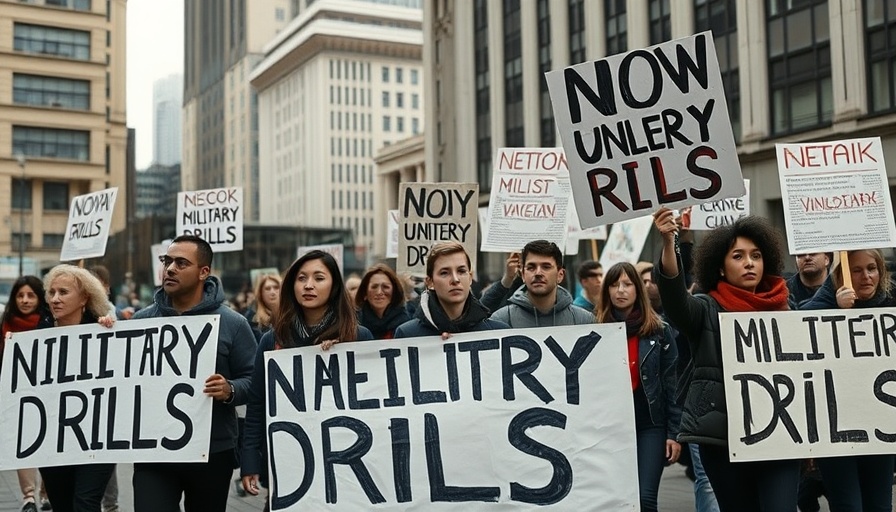
N. Korean Leader's Bold Stance Against U.S.-South Korean Drills: What It Means for the Region
As the sun casts its first light over the turbulent Korean Peninsula, tensions simmer beneath the surface. North Korean leader Kim Jong Un recently made headlines by denouncing the joint military exercises conducted by South Korea and the United States. This condemnation comes as he inspects the latest addition to his naval arsenal - a warship fitted with nuclear-capable systems. The backdrop of these events is a growing geopolitical tension, as Kim claims that these drills reflect an escalating hostility toward North Korea.
A Detailed Look: What Are the Ulchi Freedom Shield Exercises?
The ongoing Ulchi Freedom Shield joint military drills represent one of the largest military operations conducted by the U.S. and South Korea. Described by officials as defensive, the exercise mobilizes around 21,000 troops, with approximately 18,000 coming from South Korea. However, North Korea perceives these movements as rehearsals for invasion. Kim has often used these drills as justification for enhancing his country's military capabilities, further stating that the nuclear dimension of these drills intensifies the threat to North Korea.
Understanding the Historical Context of Tensions
To truly grasp the significance of Kim's comments, it's essential to understand the historical landscape of military tensions in the region. The Korean Peninsula remains divided, a legacy of the Cold War, and continues to exist in a technical state of war. Frequent military drills from both sides have resulted in a cycle of provocations and threats. Kim's aggressive rhetoric serves not only to rally domestic support but also to communicate a stance that may seek international attention and negotiation leverage.
The Implications of Kim's Military Aggression
Kim's vow for rapid nuclear expansion is particularly concerning, considering the technical advancements within the North Korean military. With his inspection of the Choe Hyon destroyer, a vessel capable of hosting potentially offensive nuclear capabilities, Kim signals an intent to bolster not just deterrent capabilities but also a readiness to act against perceived threats. These developments bring to light the precarious balance of security in the region.
How Do Ordinary South Koreans View These Drills?
The reaction from the South Korean public appears mixed. While many understand the rationale behind the military drills as necessary for national defense, a significant portion of the population expresses concern over escalating militarism and its implications for long-term peace. Protests have erupted, notably by local citizens outside the presidential office, with some calling out for a more diplomatic approach to dealing with the North. This raises questions about public sentiment and the government's handling of military strategies.
Understanding the Broader Regional Impact
These military activities and North Korean responses resonate well beyond the peninsula. Global players, including China and Russia, keep a vigilant watch on developments, impacting international relations. Heightened military readiness from South Korea may send adverse ripples through regional stability, compelling countries involved to recalibrate their diplomatic strategies. Additionally, the U.S. commitment to its allies in this region remains a key factor, shaping the global opinion of North Korean aggression.
Future Predictions: What Lies Ahead?
Looking ahead, analysts foresee a potential escalation in military posturing. With Kim's public expression of commitment to expand nuclear forces, tensions are likely to reach new heights, prompting further military exercises from the U.S. and South Korea. This cycle of preparation and response may potentially sway public opinion in North Korea, emphasizing the leaders' dedication to national defense in the face of foreign pressure.
Where Do We Go from Here?
As we observe the unfolding situation, the need for dialogue and negotiation becomes apparent. Experts suggest that both sides must engage in meaningful discussions aimed at reducing hostility. Addressing concerns related to security could play a pivotal role in breaking the cycle of aggression and fear. Will leaders take steps to foster communication, or are we doomed to endure a continuous loop of military exercises and defiance?
In conclusion, understanding the dynamics of these military drills is crucial for grasping the broader implications of regional security. As Central Florida residents, staying informed about global events, especially regarding international politics, is of utmost importance. Awareness can lead to a deeper understanding of how these situations might influence our local community and beyond.
As tensions persist, it is vital for community stakeholders to remain engaged through discussions, particularly surrounding topics of military presence and international relations that could impact our lives here at home. Together, we can advocate for a path that leads to peace and stability.
For those eager to delve deeper into these international matters, consider connecting through local discussion forums or community groups that focus on international politics. Active participation can bolster understanding and promote informed dialogue in our communities.
 Add Row
Add Row  Add
Add 




Write A Comment